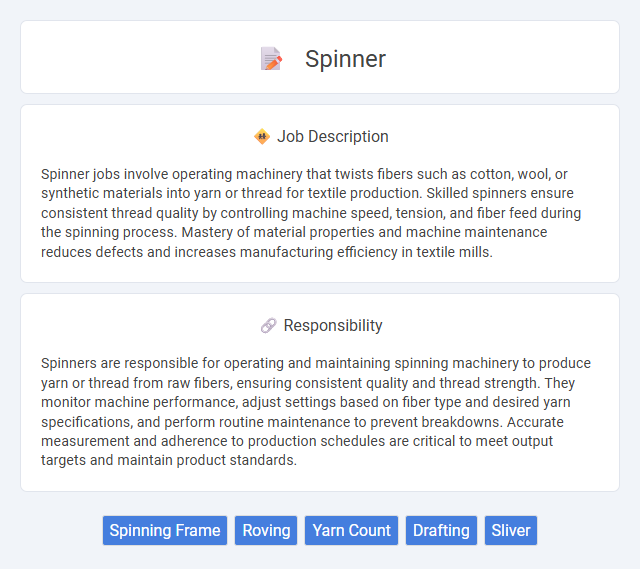
Spinner jobs involve operating machinery that twists fibers such as cotton, wool, or synthetic materials into yarn or thread for textile production. Skilled spinners ensure consistent thread quality by controlling machine speed, tension, and fiber feed during the spinning process. Mastery of material properties and machine maintenance reduces defects and increases manufacturing efficiency in textile mills.
People with strong hand-eye coordination and patience are likely to be well-suited for a spinner job, as it often requires repetitive motion and attention to detail. Individuals who can maintain focus for extended periods and possess good manual dexterity may find this role suitable, while those prone to fatigue or distraction might struggle with the demands. The physical condition of the worker, particularly good fine motor skills and stamina, will probably influence their success and comfort in this job.
Qualification
A spinner job requires proficiency in operating textile spinning machinery, with a strong understanding of fiber types and spinning techniques to ensure high-quality yarn production. Candidates typically need a high school diploma or equivalent, accompanied by hands-on experience in a manufacturing or textile environment. Skills in machine maintenance, quality control, and safety protocols are essential for efficient and safe operation in this role.
Responsibility
Spinners are responsible for operating and maintaining spinning machinery to produce yarn or thread from raw fibers, ensuring consistent quality and thread strength. They monitor machine performance, adjust settings based on fiber type and desired yarn specifications, and perform routine maintenance to prevent breakdowns. Accurate measurement and adherence to production schedules are critical to meet output targets and maintain product standards.
Benefit
Spinners likely provide significant benefits by increasing production efficiency and reducing labor costs in textile manufacturing. The automation of spinning processes may result in consistent yarn quality, minimizing defects and waste. Investing in spinner technology probably enhances overall productivity and profitability for textile businesses.
Challenge
Spinner jobs may present challenges due to the repetitive nature of the work, which could lead to fatigue or decreased concentration over time. Precision and consistency in handling materials might require sustained attention and skill, increasing the likelihood of errors if not carefully managed. The physical demands of standing for long periods or operating machinery could also contribute to workplace strain or injury risks.
Career Advancement
A Spinner's career advancement often involves gaining expertise in textile machinery operation and maintenance, leading to roles such as production supervisor or quality control specialist. Mastery of fiber properties and yarn manufacturing processes enhances opportunities for technical training and management positions. Continuous skill development in automated spinning technologies can significantly boost prospects for higher salaries and leadership roles within textile manufacturing firms.
Key Terms
Spinning Frame
The spinning frame is a critical component in the textile industry, responsible for transforming roving into yarn through twisting and winding processes. Operators, known as spinner job workers, ensure the machine runs efficiently by monitoring thread tension, repairing broken yarns, and maintaining spindle speeds to achieve consistent yarn quality. Proficiency in managing spinning frame settings boosts productivity and reduces wastage in cotton, wool, or synthetic fiber production.
Roving
A spinner's primary role in textile manufacturing involves transforming roving into yarn through the spinning process. Roving, a long and narrow bundle of fiber, is drawn out and twisted by the spinner to produce consistent yarn suitable for weaving or knitting. Mastery in handling roving and controlling twist tension directly impacts yarn quality and production efficiency.
Yarn Count
The Spinner job primarily involves the transformation of raw fibers into yarn with specific yarn counts tailored to the textile production requirements. Precise control over yarn count is essential to achieve desired fabric strength, texture, and weight, directly impacting product quality and consistency. Advanced spinning techniques and machinery adjustments are utilized to maintain yarn count accuracy within industry standards.
Drafting
A Spinner in drafting operates machinery that spins fibers into yarn or thread, ensuring precise tension and speed control to maintain consistent quality. This role demands expertise in monitoring machine settings, detecting irregularities, and adjusting parameters for optimal fiber drafting and twist insertion. Proficiency in fiber properties and spinning technology significantly improves yarn strength, uniformity, and overall production efficiency.
Sliver
A Spinner job in the textile industry involves operating spinning machines that convert fibers like cotton, wool, or synthetic materials into slivers--loose, untwisted ropes of fibers prepared for further processing. Sliver quality directly impacts the final yarn strength, uniformity, and overall fabric texture, making precision in the spinning process critical. Automation and advanced machinery enhance sliver consistency, increasing production efficiency and reducing waste in textile manufacturing.
 kuljobs.com
kuljobs.com